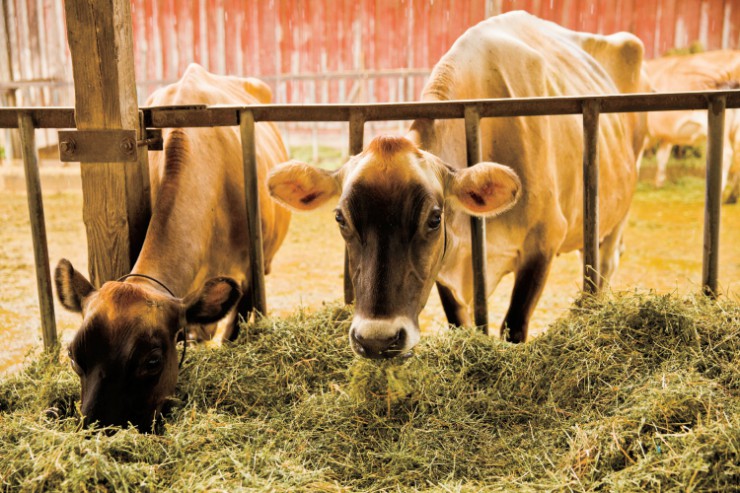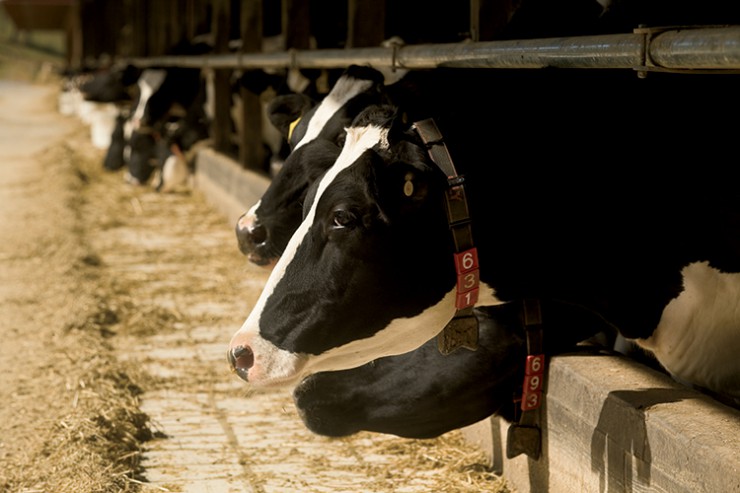Home > Virginia > Virginia Technology > Virginia Dairies Go Digital
Virginia Dairies Go Digital
In partnership with: Virginia Department of Agriculture and Consumer Services
Milk, Virginia’s official beverage of choice, is produced by the state’s nearly 700 dairy farms. Some 96,000 dairy cows live on these multigenerational farms, which embrace innovative and efficient technologies.
“More than 200 million gallons of milk were produced last year in the state,” says Eric Paulson, the Virginia State Dairymen’s Association executive director. “And our dairy production can help feed the 50 percent of the U.S. population that lives within a 500-mile drive of Richmond. The U.S. milk system is viewed by other countries as an extremely safe food supply. People worldwide want our milk and milk products.”
Milk the Value
Dairy production, a key part of Virginia’s agriculture portfolio, ranks third in cash receipts at $358 million in 2012.
Paulson is passionate about the value and integrity of the state’s dairy industry. “The industry is very focused because people have to have trust in their farmers. We produce the food people want, it’s a natural product, and penny for penny it’s the most nutritious beverage with energy, protein, vitamins and minerals already built in.”
Modern Milking
Milking a cow using a bucket and a three-legged stool isn’t the norm any longer. Many dairies have gone to various levels of mechanization, even using a robotic milking system that allows a cow to be milked on her own schedule – whenever she feels the need to milk or eat.
The Leech family of Ingleside Dairy Farm in Lexington was the first in the state to go robotic. “We were looking to involve our adult children, Beau and Jennifer, in the dairy operation in 2009 when the milk prices crashed,” Linda Leech says. “We debated whether to upgrade the milking parlor and expand the herd, so we visited 25 different dairies in the U.S. and Canada. We retrofitted our freestyle barns and added the A-4 Lely robotic milking system.”

Since its implementation in February 2012, the system has provided substantial benefits. A robotic system completely manages the dairy herd through its monitoring.
“It knows more about an individual cow than if we stood there 24 hours a day watching her,” Leech says. “The milk’s health and the cow’s activity are all tracked. The specific care of our 240-cow herd allows us to now attend events where we couldn’t before, and we can focus more acutely on the cows’ comfort.”
Tracking Cow Comfort
Waynesboro’s fourth-generation dairy farmers Kevin, Daniel, Winston and Wilmer Phillips of North Point Farms aren’t afraid to try new things when it comes to efficiency and cattle care. Their 900 cows, spread between three dairy sites, are milked three times daily. “We want to produce high-quality products for consumers, and our cows get whatever they want to be healthy and efficient,” Kevin says. “They wear pedometers to track their mobility, and a Bella Ag sensor that tracks abnormal temperatures. A Dairy Cheq MilkGuard device also monitors the milk-cooling equipment.”
From Manure to Energy
VanDerHyde Dairy in Chatham became the first in Virginia to install carousel milking parlors, cattle identification programs and a Wi-Fi system to help effectively track its 1,100 cattle. What’s more, owner Roy VanDerHyde also sought to maximize the dairy’s end product – manure.
“I always look to technology to help our income, so building an anaerobic digester made sense,” he says. “Instead of putting the cows’ manure in holding ponds where it’s only spread twice a year on fields, the 30,000 gallons per day is placed in the digester.”
The resulting product, through a series of processes, results in 300,000 kilowatts of electricity sold to Dominion, a Richmond-based electric company, by VanDerHyde’s private company, Dairy Energy Inc.
“Maximizing our resources while providing optimum cattle care is what we’re all about,” VanDerHyde says.




